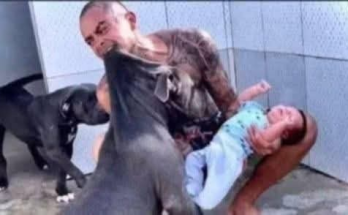
The night felt heavier than usual in the hospital ward. The air was thick with the steady rhythm of monitors, the soft shuffle of nurses’ shoes, and the quiet, unspoken worry that hung over the room.
Walter lay in the bed, frail and pale, his chest rising and falling with labored breaths. The doctors had warned his family: He might not make it through the night. Every cough shook his entire frame, and his oxygen levels dipped dangerously low.
But amid the quiet chaos, he kept saying one word — a name — over and over again.
“Murphy… Murphy…”
At first, the repetition seemed like the confused rambling of a man in pain. His daughter thought it might be the name of an old army friend, a relative they had forgotten to call, or perhaps a neighbor from years past. But Walter’s voice carried a certain urgency — a longing that made everyone pause.
When I leaned close to ask who Murphy was, his lips barely moved, but I caught the words:
“My good boy… My good boy is missed.”
It clicked. I stepped into the hallway and called his daughter, who was still hours away, driving in from another state.
“Is Murphy a dog?” I asked.
Her voice cracked. “He’s a thirteen-year-old Golden Retriever. While Dad’s been here, we’ve had to keep him at my brother’s house.”
Something in me knew that Murphy needed to be here. The head nurse, a kind but no-nonsense woman, raised an eyebrow when I suggested it. But after a few phone calls, a pile of paperwork, and some gentle persuasion, she agreed.
A few hours later, the sound of nails clicking on the tile floor echoed down the hallway. Murphy appeared — golden fur now streaked with white, his gait a little slower with age, but his tail wagging steadily.
When he entered the room, everything shifted. The beeping monitors faded into the background. The fluorescent lights seemed softer. Walter’s eyes fluttered open, and for the first time in days, a faint smile tugged at the corners of his mouth.
Murphy approached the bed and rested his chin gently on Walter’s lap, as if he’d been waiting for this moment all along. Walter’s hand, trembling but determined, reached out to stroke the familiar fur.
Then Walter spoke again. “Did you find her, Murphy?”
His daughter furrowed her brow. “Who’s ‘her’?” she asked quietly.
Walter’s breathing steadied. His voice, though weak, carried a story that pulled us all in.
Years ago, when Murphy was still young and bursting with energy, Walter lived next door to a teenage girl named Lizzie. She often came over to walk Murphy, and the two formed an easy friendship. Then one winter day, she disappeared.
Walter had a feeling something was wrong. While others assumed she had run away, he couldn’t shake the sense that she was in danger. So, he and Murphy searched.
Days passed without luck — until one morning, Murphy froze on a wooded trail, growled, and refused to move forward. Following the dog’s lead, Walter pushed through some brambles and spotted a scrap of fabric. It was Lizzie’s scarf.
They found her in a shallow ditch, cold and frightened. She had run from an abusive home, unsure where to turn. Walter stayed with her until help arrived, and social services placed her somewhere safe.
After that, they exchanged letters for years. But time moved on, and eventually the correspondence faded.
Walter never stopped wondering about her. And apparently, neither did Murphy.
Twelve years later, Walter shared the rescue story anonymously online. Three days after posting it, a message arrived:
“My name was Lizzie. That sounds like me.”
When she came to visit, she brought her young daughter. The moment she walked in, Walter recognized her smile. Murphy, older but still protective, greeted her as though no time had passed.
From then on, Lizzie — now Elena — became part of Walter’s life again, often stopping by to help him and to give Murphy extra attention.
And now, in the hospital room, Murphy was back at Walter’s side, fulfilling one last duty.
Walter’s condition stabilized over the following days. Nurses marveled at the change — his breathing was stronger, his spirits higher. One morning, Walter turned to me and asked, “Do you think a dog can save a life?”
I smiled. “I think I’ve seen it happen.”
Months later, Walter passed peacefully in his sleep. On that final night, Murphy lay beside him, head resting gently on his chest. At the funeral, Elena spoke through tears.
“Walter believed in me when no one else did. And Murphy… Murphy found me. Twice.”
The next day, a small stone marker was placed in Walter’s garden. It read:
Murphy — Guardian Angel. Forever a Good Boy.
Sometimes, the smallest acts of love — a walk in the woods, a dog’s intuition, a man’s refusal to give up — can change a life forever.


